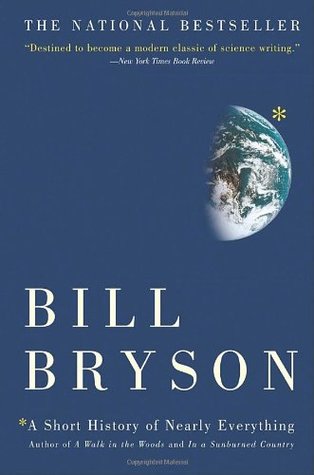A Short History of Nearly Everything
 A Short History of Nearly Everything is very well researched, subtly written and does pretty much what it says: explain the history of science up to the present as humanity is trying to figure out where it came from, how long ago it happened and how things actually work. It's a dense work, which makes it a long read. You either go through it and not retain much or you have to read bit by bit and think on each for a while. I read it bit by bit and retained little.
A Short History of Nearly Everything is very well researched, subtly written and does pretty much what it says: explain the history of science up to the present as humanity is trying to figure out where it came from, how long ago it happened and how things actually work. It's a dense work, which makes it a long read. You either go through it and not retain much or you have to read bit by bit and think on each for a while. I read it bit by bit and retained little.
Anyway, as I was reading The Invention of Nature, another great popular science book, I've stumbled upon this quote "There are three stages of scientific discovery: first people deny it is true; then they deny it is important; finally they credit the wrong person." and never have I thought about it so much as when reading A Short History of Nearly Everything. In fact, the same quote appears in the book near the end. As Bill Bryson describes it, most of science is accidental and has to fight a plethora of egos that believe they are better than you just in order to surface. Many times the work is lost, misattributed, stolen or sabotaged into oblivion by personal opponents. As such, the book has a wonderful freshness from the tired history of science that we are so often presented where very smart people think of something and then everybody applauds and accepts another idea that will further human knowledge. The book is also about how little we know about many things that usually are presented as completely clear, fully researched and completely understood. All in all, it's a book that needs reading.
"So", you will say, "isn't this another Sapiens?". No. I liked Sapiens and its funny and accessible style made it an instant hit worldwide. A Short History of Nearly Everything is way better. It focuses more on sciences like geology and anthropology and abstract physics and on the personal histories of the people involved in the discoveries rather than on humanity as a whole, so it's a bit harder. When it does look at humanity it sees it as small, petty and destructive. Sapiens makes you feel good, this makes you feel ashamed and happy you are still alive.
I have to say that I almost abandoned reading it; it is that dense and full of information. If I was reading a novel in three days, spending weeks trudging through knowledge made me feel both too stupid and getting smarter at the same time. Surely I could find a better way to entertain myself, I thought. This book is entertaining, but it requires focus to read and understand. In the end, I am very glad I've read it.
Comments
Be the first to post a comment